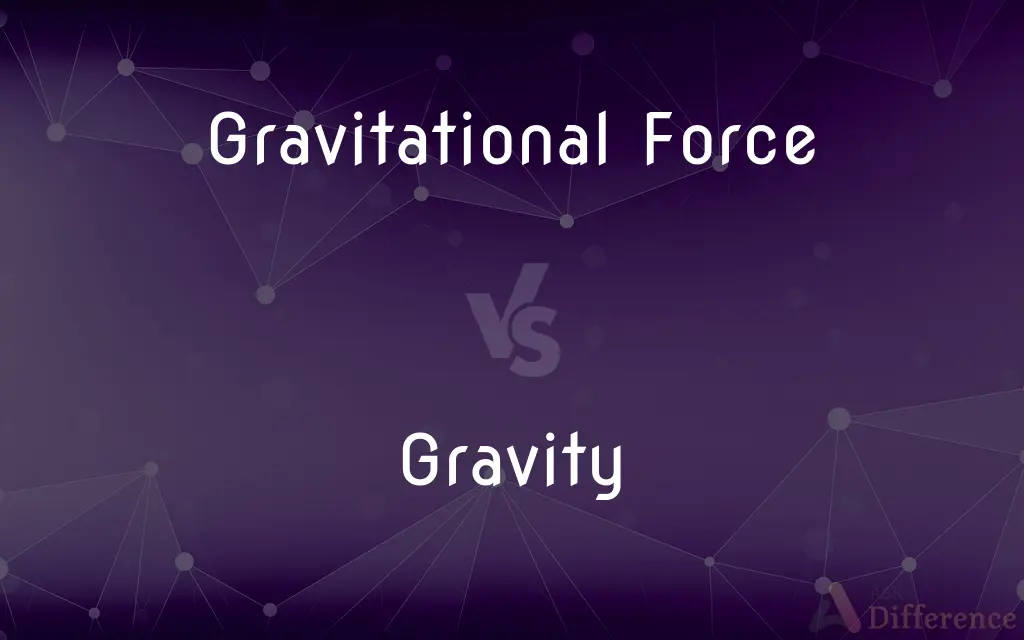Gravitational Force vs. Gravity — What's the Difference?
By Tayyaba Rehman — Published on October 13, 2023
Gravitational force is the attractive force between two masses, while gravity is the fundamental force driving this attraction, often associated specifically with the acceleration due to Earth’s pull.

Difference Between Gravitational Force and Gravity
Table of Contents
ADVERTISEMENT
Key Differences
Gravitational Force refers to the actual force exerted between two masses due to their mass and the distance between them, based on Newton's law of universal gravitation. It is quantifiable and its magnitude depends on the masses of the objects and the distance separating them. Gravity, on the other hand, refers more generally to the fundamental force of attraction that exists between any two masses, any two bodies, any two particles. It is one of the four fundamental forces of nature and is often specifically associated with the gravitational pull exerted by the Earth.
Gravitational Force is a manifestation of the inherent property of mass to attract other masses and can be calculated using the gravitational constant. It enables the calculation of the specific attractive force between two objects. In contrast, Gravity is a universal principle or law governing the interaction between masses, not a measurable force between specific objects, but rather the cause behind the existence of gravitational forces.
The concept of Gravitational Force is crucial for understanding the interactions between celestial bodies and is pivotal in astrophysics and cosmology, allowing the analysis of planetary motion and the structure of the universe. Gravity, as a fundamental force, is integral to the foundational principles of physics, explaining the natural phenomenon of attraction between masses and is indispensable for understanding the behavior of objects in the universe.
To comprehend celestial mechanics, orbital motions, and tidal forces, a deep understanding of Gravitational Force is imperative as it governs the movement and interaction of celestial bodies. Understanding Gravity is foundational to physics and essential for exploring how the universe works, the formation of stars, planets, and galaxies, and it has profound implications on the study of the cosmos.
Comparison Chart
Definition
The attractive force between two masses
The fundamental force of attraction between masses
ADVERTISEMENT
Specificity
Specific, quantifiable between two objects
General principle governing mass interaction
Field of Study
Integral to astrophysics and celestial mechanics
Foundational to physics and cosmology
Calculation
Can be calculated with gravitational constant
It is a universal constant, not specifically calculated between two objects
Application
Used to analyze planetary motion and structure of the universe
Essential for understanding behavior of objects in the universe and the formation of celestial bodies
Compare with Definitions
Gravitational Force
Gravitational Force is the force of attraction between two masses.
The gravitational force between the Earth and the Moon causes the tides on Earth.
Gravity
Gravity is one of the four fundamental forces of nature.
Gravity, along with electromagnetic, strong nuclear, and weak nuclear forces, governs the interactions of objects in the universe.
Gravitational Force
Gravitational Force governs the interaction and movement of celestial bodies.
The gravitational force of the sun keeps the planets in orbit around it.
Gravity
Gravity is often specifically associated with the gravitational acceleration due to Earth’s pull.
Gravity on Earth is responsible for objects falling towards the ground when dropped.
Gravitational Force
Gravitational Force is pivotal in understanding celestial mechanics and tidal forces.
Gravitational force exerted by the moon and the sun is responsible for the occurrence of high and low tides on Earth.
Gravity
Gravity governs the formation and interaction of celestial bodies.
Gravity causes the formation of stars and planets by pulling together masses of dust and gas in space.
Gravitational Force
Gravitational Force is quantifiable and depends on the mass of objects and the distance between them.
The gravitational force between two objects decreases as the distance between them increases.
Gravity
Gravity is the fundamental force of attraction between any two masses.
Gravity is what keeps us grounded on Earth.
Gravitational Force
Gravitational Force is a manifestation of the fundamental force of gravity.
Gravitational force acting between Earth and a falling apple results in the apple falling to the ground.
Gravity
Gravity has a profound influence on the structure and behavior of the cosmos.
Understanding gravity is crucial for exploring the mysteries of the universe and the behavior of objects in it.
Gravity
The natural attraction between physical bodies, especially when one of the bodies is a celestial body, such as the earth.
Gravity
See gravitation.
Gravity
Grave consequence; seriousness or importance
They are still quite unaware of the gravity of their problems.
Gravity
Solemnity or dignity of manner.
Gravity
The state or condition of having weight; weight; heaviness.
Gravity
The state or condition of being grave; seriousness.
I hope you appreciate the gravity of the situation.
Gravity
(music) The lowness of a note.
Gravity
(physics) The force at the Earth's surface, of the attraction by the Earth's masses, and the centrifugal pseudo-force caused by the Earth's rotation, resulting from gravitation.
Gravity
Gravitation, the universal force exercised by two bodies onto each other.
Gravity
(physics) Specific gravity.
Gravity
The state of having weight; beaviness; as, the gravity of lead.
Gravity
Sobriety of character or demeanor.
Gravity
Importance, significance, dignity, etc; hence, seriousness; enormity; as, the gravity of an offense.
They derive an importance from . . . the gravity of the place where they were uttered.
Gravity
The tendency of a mass of matter toward a center of attraction; esp., the tendency of a body toward the center of the earth; terrestrial gravitation.
Gravity
Lowness of tone; - opposed to acuteness.
Gravity
(physics) the force of attraction between all masses in the universe; especially the attraction of the earth's mass for bodies near its surface;
The more remote the body the less the gravity
The gravitation between two bodies is proportional to the product of their masses and inversely proportional to the square of the distance between them
Gravitation cannot be held responsible for people falling in love
Gravity
A manner that is serious and solemn
Gravity
A solemn and dignified feeling
Common Curiosities
Is Gravity specific to Earth?
No, while often associated with Earth’s pull, Gravity is a universal force acting between any two masses.
What is the main difference between Gravitational Force and Gravity?
Gravitational Force is the specific force of attraction between two masses, while Gravity is the fundamental force that causes this attraction.
Can Gravitational Force be calculated?
Yes, Gravitational Force can be calculated using the masses of the objects and the distance between them.
Does Gravitational Force affect celestial bodies?
Yes, Gravitational Force governs the movement and interaction of celestial bodies like stars and planets.
Share Your Discovery

Previous Comparison
Condemnation vs. Criticism
Next Comparison
PIN Code vs. ZIP CodeAuthor Spotlight
Written by
Tayyaba RehmanTayyaba Rehman is a distinguished writer, currently serving as a primary contributor to askdifference.com. As a researcher in semantics and etymology, Tayyaba's passion for the complexity of languages and their distinctions has found a perfect home on the platform. Tayyaba delves into the intricacies of language, distinguishing between commonly confused words and phrases, thereby providing clarity for readers worldwide.
















































